2023 Annual Report
____________________________
© His Majesty the King in Right of Canada, represented by the Military Police Complaints Commission of Canada, 2024.
Catalogue No. DP1E‑PDF | ISSN 1910‑8230
Table of Contents
- Message From the Chairperson
- Organizational Information
- Organizational Chart
- The Complaints Process
- Year in Review – Operations
- Year in Review – Corporates Services
- Corporate Information
Letter of Transmission to the Minister
March 26, 2024
The Honourable Bill Blair, P.C., C.O.M, M.P.
Minister of National Defence
National Defence Headquarters
MGen George R. Pearkes Building
Ottawa, Ontario K1A 0K2
Dear Minister Blair:
Subject: Military Police Complaints Commission of Canada – Annual Report 2023
In accordance with subsection 250.17(1) of the National Defence Act, I submit the 2023 annual report of the Military Police Complaints Commission of Canada, for tabling in Parliament.
In this annual report, you will find a discussion of significant aspects of the Military Police Complaints Commission of Canada’s activities and challenges during 2023, including summaries of some of its reviews and investigations of complaints, all of which is respectfully submitted.
Sincerely,
Original signed by
_________________________________
Me Tammy Tremblay, MSM, CD, LL.M.
Chairperson
Message From the Chairperson

I am pleased to present the 2023 Annual Report for the Military Police Complaints Commission of Canada (the MPCC). This report provides information about the MPCC’s achievements in providing civilian oversight of the military police and details the challenges faced this year in holding the military police accountable.
As I complete my first year as Chairperson for the MPCC, I am inspired and motivated by the important work before us. I am well supported by a small and very dedicated team who enables the MPCC to reach its ambitious objectives day after day. I want to thank my predecessor, Bonita Thornton, who assured a very capable leadership of the MPCC in the interim period before my appointment, and a heartfelt thank you to the MPCC’s Senior General Counsel and Director General, Julianne Dunbar, for her unparalleled support during this transition.
One of my top priorities as Chairperson is enhancing military policing through accountability and ensuring an independent oversight system that is transparent, accessible, timely and rigorous. At a time when public confidence in policing is at the forefront of public discourse, strong accountability mechanisms are critical to maintain public trust in policing.
The MPCC continues to see an increase in the number of complaints it receives. In fact, in 2023, the number of complaints almost doubled. The complaints we received are also more complex in nature. Indeed, this year, the MPCC dealt with matters such as bias in sexual assault investigations, arson, and attempted murder. The MPCC deemed it necessary, in some of these cases, to hold public interest investigations. In light of the increase in numbers and complexity, and because the MPCC’s baseline funding has not changed since 2013, we sought additional funding to help us tackle the increased workload. This funding allowed us to add resources to an overtaxed system to maintain efficiency and timeliness of the complaint process.
This year, the MPCC issued 13 final reports outlining the results of its investigations into allegations of military police misconduct or allegations of interference in a military police investigation. The MPCC made 23 recommendations to the Canadian Forces Provost Marshal (CFPM) aimed at ensuring the highest standards of conduct in military policing. The CFPM accepted 39% of those recommendations, which marked a significant decline in the number of recommendations accepted from previous years.
In addition to its operations, the MPCC has invested resources in diversifying its engagement activities and outreach goals, to increase knowledge of the MPCC’s mandate and role for civilians, unions, training bases and organizations supporting victims of sexual misconduct, as well as strengthening its role in the broader federal and provincial oversight regime. It has increased its accessibility by improving employment processes and investing in the physical and virtual office, information technology, communication tools and the design and delivery of its programs and services.
Our most significant challenge this year was the erosion of the MPCC’s ability to exercise civilian oversight of the military police. The MPCC used a great deal of resources and effort to obtain relevant documents from the CFPM to enable it to conduct fair and fulsome investigations. In too many instances, we have seen resistance or refusal to disclose information the MPCC needs to investigate complaints; a reduction in the number of recommendations accepted by the CFPM; a refusal to respond to recommendations; a refusal to provide updates on files currently being reviewed by the Office of Professional Standards of the CFPM; and restrictive and unilateral interpretation of the MPCC’s jurisdiction. The MPCC has been forced to turn to the Federal Court to obtain the documents it is legally entitled to review as part of its mandate. These unfortunate barriers dilute the will of Parliament in setting up a strong oversight system for the police and must be addressed.
As such, it is more critical than ever that the National Defence Act be amended now to strengthen the MPCC’s mandate, and, to ensure the MPCC has access to information needed to investigate complaints, and in particular the authority to summon witnesses outside of a public interest hearing. Independent oversight of law enforcement is crucial to police legitimacy and effectiveness; one cannot exist without the other. However, that legitimacy and effectiveness are eroded when the civilian police oversight body cannot easily access the information needed to perform its review and oversight roles, and encounters resistance in implementing recommendations aimed at improving the system. This year, I wrote to the past and current ministers of National Defence urging the implementation of the recommendations pertaining to the MPCC from the Third Independent Review of the National Defence Act and additional legislative proposals to strengthen the civilian oversight regime of the military police. Implementing these recommendations would demonstrate to Canadians that all federal law enforcement officers in our country, including those who wear military uniforms, are held to account for their conduct by an independent oversight mechanism that has the legislative means to effectively do so.
Me Tammy Tremblay, MSM, CD, LL.M
Chairperson
Organizational Information
The Military Police Complaints Commission (MPCC) is an administrative tribunal created by Parliament to provide independent, civilian oversight of the Canadian Forces Military Police.
Mission
To promote and ensure the highest standards of conduct by the military police, to deter interference in military police investigations and to enhance public confidence in military policing.
Mandate
The MPCC’s mandate is set out in Part IV of the National Defence Act, which provides the following powers:
- monitoring investigations by the Canadian Forces Provost Marshal of military police conduct complaints;
- reviewing disposition of conduct complaints about military police members, at the request of complainants;
- investigating complaints of interference made by military police members;
- conducting public interest investigations and hearings;
- reporting findings and making recommendations directly to the military police and national defence leadership.
Vision
To be an authority on independent civilian oversight of the police by providing an impartial, accessible and efficient complaints process.
Values

Alternate format
The image shows a radial diagram illustrating the Military Police Complaints Commission of Canada’s (MPCC) values:
- Impartiality
- Independence
- Integrity
- Rigour
- Transparency
- Respect
- Inclusion
Organizational Chart
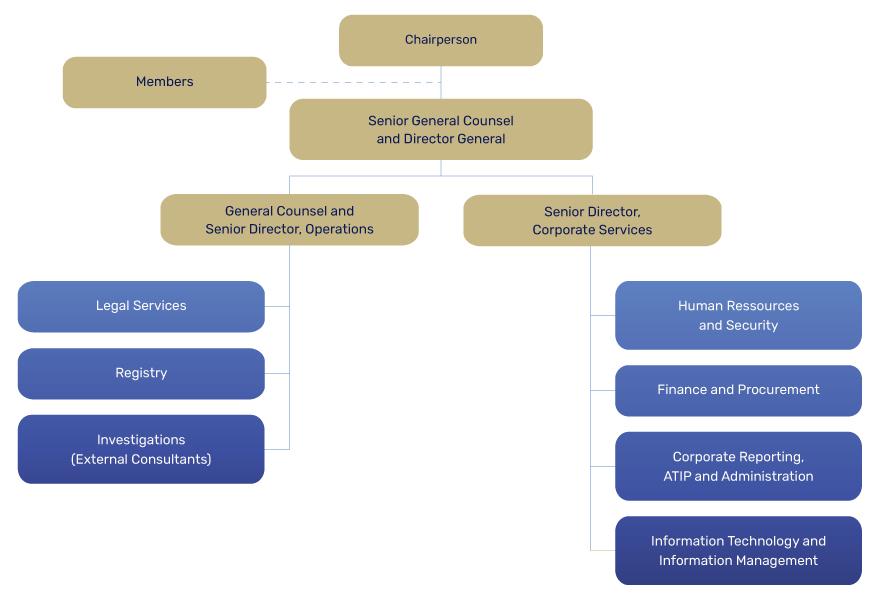
Alternate format
This is an image of an organizational chart showing the Military Police Complaints Commission of Canada’s (MPCC) organizational structure.
The MPCC is headed by the Chairperson.
The Senior General Counsel and Director General and the Members report directly to the Chairperson.
The General Counsel and Senior Director of Operations and the Senior Director of Corporate Services report to the Senior General Counsel and Director General.
The General Counsel and Senior Director of Operations manages:
- Legal Services
- Registry
- Investigations (External Consultants)
The Senior Director of Corporate Services manages:
- Human Resources and Security
- Finance and Procurement
- Corporate Reporting, Access to Information and Privacy (ATIP), and Administration
- Information Technology and Information Management
The Complaints Process
The MPCC has jurisdiction over two types of complaints: conduct complaints and interference complaints.
Conduct Complaints
Any person may file a complaint about the misconduct of a member of the military police in the performance of their "policing duties or functions." These complaints are first handled by the Canadian Forces Provost Marshal (CFPM), with the MPCC monitoring this process. The CFPM then submits its final report, and if the complainant is dissatisfied with the CFPM’s conclusion, they may ask the MPCC to review the complaint. In such a case, the MPCC receives a copy of the relevant documents, determines the scope of the review, i.e., whether an investigation is required, then draws conclusions and, where appropriate, issues recommendations in an interim report. The interim report is submitted to the Minister of National Defence, the Chief of the Defence Staff (CDS) and the CFPM.
The MPCC then receives a notice of action from the CFPM, which is the Canadian Forces’ (CF) official response to the interim report. This describes the actions that have been or will be taken in response to the MPCC’s recommendations, if any. After reviewing the notice of action, the MPCC issues its final report, which is provided to the complainant, the subject(s) of the complaint, the CFPM and other statutory recipients.
The diagram below shows the steps in the process of handling a conduct complaint.
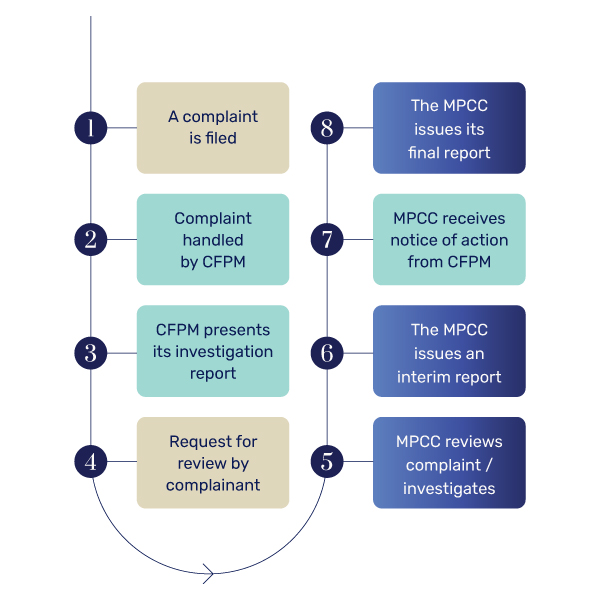
Alternate format
This is an image of a diagram showing the steps in the process of handling a conduct complaint with the Military Police Complaints Commission of Canada (MPCC):
- A complaint is filed
- Complaint handled by Canadian Forces Provost Marshal (CFPM)
- CFPM presents its investigation report
- Request for review by complainant
- MPCC reviews complaint/ investigates
- The MPCC issues an interim report
- MPCC receives notice of action from CFPM
- The MPCC issues its final report
Interference Complaints
Only military police members conducting or supervising an investigation may file an interference complaint if they believe that a member of the CF or a senior official of the Department of National Defence has interfered with or attempted to influence their investigation. Unlike conduct complaints, the MPCC has exclusive jurisdiction over interference complaints.
Following its investigation, the MPCC draws conclusions and, where appropriate, issues recommendations in an interim report. This report is submitted to the Minister of National Defence, to the Chief of the Defence Staff if the alleged interference was on the part of a member of the CF, or to the Deputy Minister if the subject of the complaint is a senior officer of the department, as well as to the Judge Advocate General and the CFPM.
The MPCC then receives the notice of action from the Chief of the Defence Staff or Deputy Minister, outlining what action, if any, has been or will be taken as a result of the MPCC’s recommendations. The MPCC then issues its final report which is provided to the complainant, the subject(s) of the complaint, the CFPM and other statutory recipients.
The diagram below outlines the steps involved in handling an interference complaint.
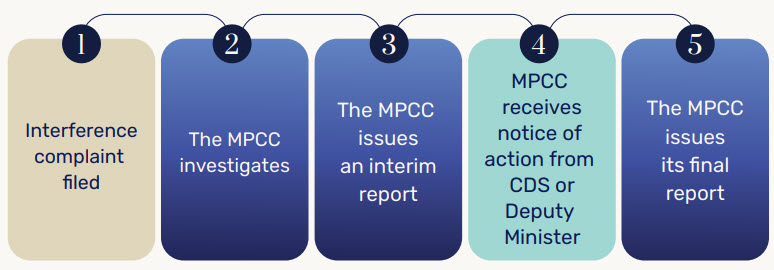
Alternate format
This is an image of a diagram showing the steps in the process of handling an interference complaint with the Military Police Complaints Commission of Canada (MPCC):
- Interference complaint filed
- The MPCC investigates
- The MPCC issues an interim report
- MPCC receives notice of action from the Chief of the Defence Staff (CDS) or Deputy Minister
- The MPCC issues its final report
Public Interest Investigations or Hearings
The Chairperson of the MPCC may also, at any time, cause a public interest investigation or hearing to be held into a complaint of misconduct or interference, which gives her different powers. The decision of whether the public interest would be served by causing the MPCC to conduct a public interest investigation is made on a case-by-case basis. Considerations taken into account in past decisions to conduct public interest investigations include:
- the inherent seriousness of the alleged conduct;
- the systemic issues raised in the complaint;
- the involvement of senior officials or military officers;
- the public interest in the issues related to the complaint;
- process considerations which suggest that it would be more fair, credible, coherent or efficient to deal with the complaint as a public interest case.
Further information on our complaints handling process can be found on our website in the following sections:
Year in Review – Operations
Statistics
The CFPM is generally responsible in the first instance for dealing with conduct complaints, except for complaints against him. A complainant who is dissatisfied with the CFPM’s handling of their complaint can refer the matter to the MPCC to review. Interference complaints are handled by the MPCC in the first instance.
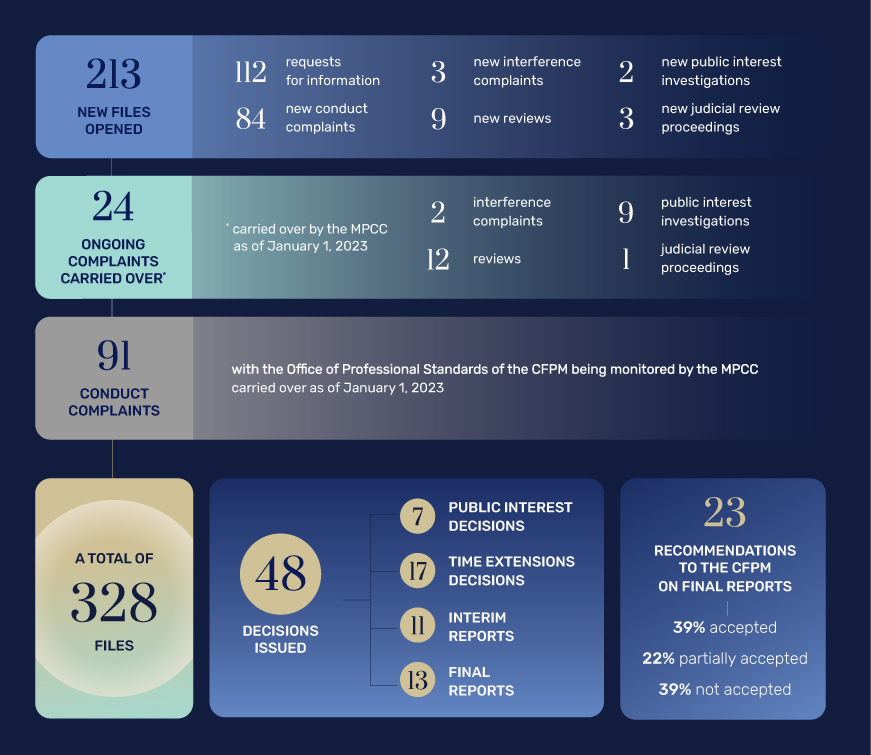
Alternate format
The image is that of a table showing the year in review in numbers for the Operations section of the Military Police Complaints Commission of Canada (MPCC):
-
213 new files opened, broken down as follows:
- 112 requests for information
- 84 new conduct complaints
- 3 new interference complaints
- 9 new reviews
- 2 new public interest investigations
- 3 new judicial review proceedings
-
24 ongoing complaints carried over by the MPCC as of January 1, 2023, broken down as follows:
- 2 interference complaints
- 12 reviews
- 9 public interest investigations
- 1 judicial review proceedings
- 91 conduct complaints with the Office of Professional Standards of the Canadian Forces Provost Marshal (CFPM) being monitored by the MPCC carried over as of January 1, 2023
- A total of 328 files
-
48 decisions issued, broken down as follows:
- 7 public interest decisions
- 17 time extensions decisions
- 11 interim reports
- 13 final reports
-
23 recommendations to the CFPM on final reports:
- 39% accepted
- 22% partially accepted
- 39% not accepted
Service Standards
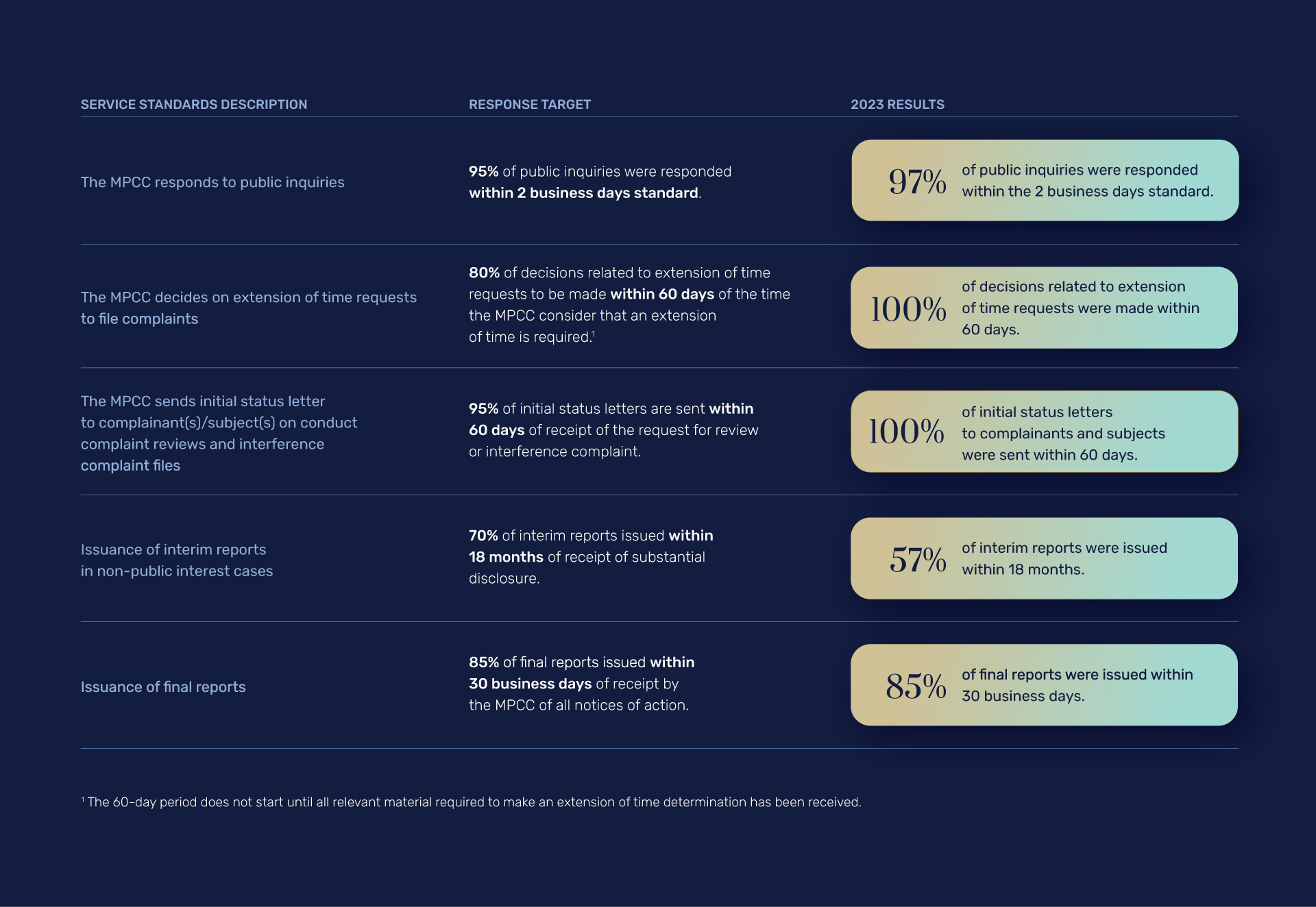
Alternate format
The image is that of a table showing the service standards of the Military Police Complaints Commission of Canada (MPCC) divided into three columns, with the following headings:
- Service Standards Description
- Response Target
- 2023 Results
The table is divided into 5 lines, as follows:
Line 1
Service Standard Description: The MPCC responds to public inquiries.
Response Target: 95% of public inquiries were responded within 2 business days standard.
2023 Results: 97% of public inquiries were responded within the 2 business days standard.
Line 2
Service Standard Description: The MPCC decides on extension of time requests to file complaints.
Response Target: 80% of decisions related to extension of time requests to be made within 60 days of the time the MPCC consider that an extension of time is required.Footnote 1
2023 Results: 100% of decisions related to extension of time requests were made within 60 days.
Line 3
Service Standard Description: The MPCC sends initial status letter to complainant(s)/subject(s) on conduct complaint reviews and interference complaint files.
Response target: 95% of initial status letters are sent within 60 days of receipt of the request for review or interference complaint.
2023 Results: 100% of initial status letters to complainants and subjects were sent within 60 days.
Line 4
Service Standard Description: Issuance of interim reports in non-public interest cases.
Response target: 70% of interim reports issued within 18 months of receipt of substantial disclosure.
2023 Results: 57% of interim reports were issued within 18 months.
Line 5
Service Standard Description: Issuance of final reports.
Response target: 85% of final reports issued within 30 business days of receipt by the MPCC of all notices of action.
2023 Results: 85% of final reports were issued within 30 business days.
This year, the MPCC was only able to issue interim reports in non public interest cases within 18 months, 57% of the time instead of the standard we aim for, which is 70%. Several reasons contributed to this:
- the complexity and volume of complaints;
- the unexpected departure of two of our part-time decision makers;
- the delays from the military police in disclosing relevant information required to investigate complaints, which will be detailed below.
Trends
The MPCC noted a significant increase in the number of new conduct complaints received in 2023, creating a historically high workload. In fact, the average number of conduct complaints in the past 3 years was 47, and this year, it increased to 84. The number of requests for information from the public also increased this year.
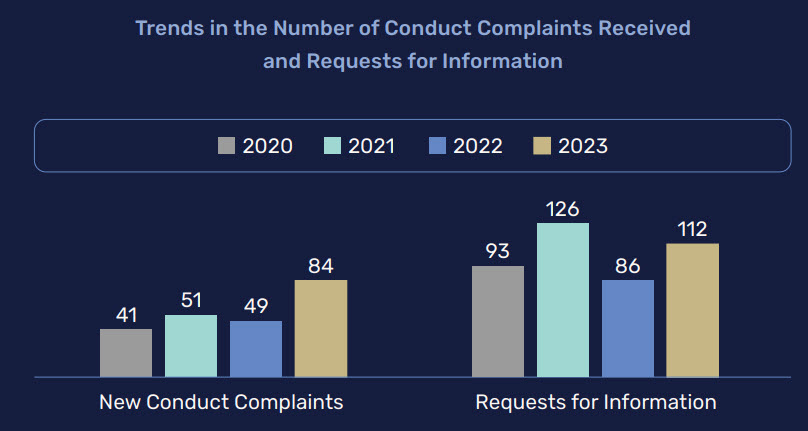
Alternate format
This is an image of a vertical bar chart entitled "Trends in the Number of Conduct Complaints Received and Requests for Information," displaying data from 2020 to 2023 for two categories: "New Conduct Complaints" and "Requests for Information."
The breakdown of the data is as follows:
-
New Conduct Complaints
- 2020: 41
- 2021: 51
- 2022: 49
- 2023: 84
-
Requests for information
- 2020: 93
- 2021: 126
- 2022: 86
- 2023: 112
In light of this increase to the number of complaints, the MPCC onboarded three new contract investigators to the team and hired additional in-house counsel, to help us tackle the increased workload in an efficient and timely manner.
Over the past two years, the MPCC has also seen an important increase in the number of complaints received related to sexual misconduct.
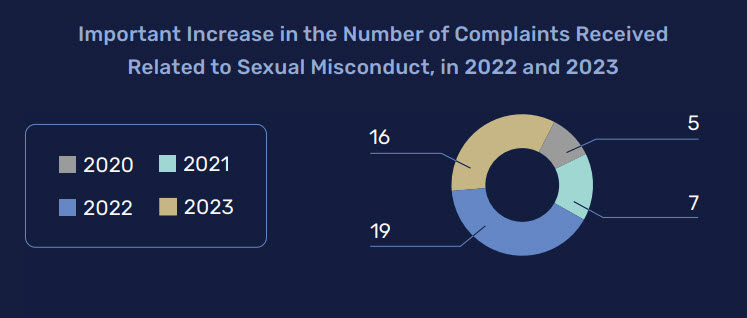
Alternate format
This is an image of a pie chart entitled "Important Increase in the Number of Complaints Received Related to Sexual Misconduct, in 2022 and 2023." The chart shows the number of complaints received related to sexual misconduct for the years 2020 to 2023.
The breakdown of the data is as follows:
- 2020: 5
- 2021: 7
- 2022: 19
- 2023: 16
The MPCC has noted an alarming increase in the number of its final report recommendations that were not accepted by the CFPM in 2023, compared with previous years.
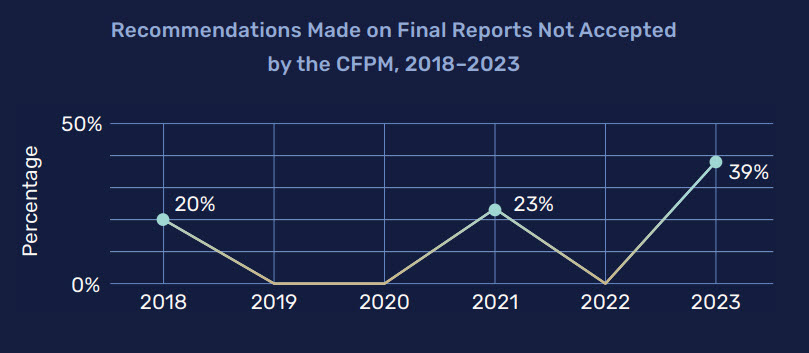
Alternate format
This is an image of a horizontal line graph entitled "Recommendations Made on Final Reports Not Accepted by the Canadian Forces Provost Marshal (CFPM), 2018-2023," with years shown on the x-axis and percentages on the y-axis. The graph shows the percentage of recommendations made on final reports that were not accepted by the CFPM for the years 2018 to 2023.
The breakdown of the data is as follows:
- 2018: 20%
- 2019: 0%
- 2020: 0%
- 2021: 23%
- 2022: 0%
- 2023: 39%
Oversight Challenges
Oversight of law enforcement is critical to police legitimacy and effectiveness. This past year was a challenging year for the MPCC in its mission to provide accountability through independent oversight of the military police. As outlined in the next section, the legislative scheme for military police accountability is one of the weakest models in Canada and is in dire need of modernization. That said, even the current requirements provided under the National Defence Act, are, at times, not respected. This erodes the accountability scheme of the military police, at a time when public confidence in policing is at the forefront of public discourse.
Resistance of the CFPM to Oversight by the MPCC
This resistance has manifested in several ways. The CFPM has, at times, refused to disclose information to which the MPCC is legally entitled and that it requires to fulfill its legislative mandate. In other areas, where cooperation with requests for information from the MPCC is within the discretion of the CFPM, the CFPM has declined to provide any assistance. Furthermore, in instances where relevant information is disclosed to the MPCC, it has been subjected to excessive redaction, preventing the MPCC from having full disclosure of the evidence it requires to fulfill its mandate.
Refusal to Disclose Information
In the case of conduct complaint reviews, the CFPM has a clear legislative obligation to provide the MPCC with all information and materials relevant to the complaint. However, in respect to four complaints in 2023, the Deputy CFPM refused to provide such disclosure. Initially, this took the form of an outright refusal, and after months of correspondence, the Deputy CFPM provided only part of the requested material.
In these instances, the Deputy CFPM stated that the subject matter of the complaint–the conduct of complaint investigations by the Office of Professional Standards of the CFPM–did not constitute "policing duties or functions." The Deputy CFPM advised that such complaints fell outside the process established in Part IV of the National Defence Act and therefore, the requested disclosure was not relevant. Further, the office of the CFPM argued that the materials requested were not reviewed by the Deputy CFPM in addressing the complaint so it would not be disclosed.
The MPCC and the CFPM have had differences in the past over the scope of military police "policing duties or functions" that may be the subject of a complaint. However, unlike previous instances, the CFPM refused to disclose the information based on his unilateral determination of the MPCC’s jurisdiction. It is highly improper for the police service that is overseen to determine the jurisdiction of the oversight body. Further, the failure of the CFPM to review pertinent documents cannot determine the MPCC’s authority to review material relevant to the complaint at hand. This results in an absurdity where the CFPM can limit the relevant disclosure simply by not assessing it in the first instance. In fact, the Federal Court confirmed that it is the responsibility of the MPCC, as the independent oversight body mandated by Parliament to "make its own, independent decision as to what documents it considers necessary for a full investigation of the complaint." Footnote 2
The Court further wrote, "[…] [a]t the end of the day, one principle must stand: it is for the Commission, not for the government, to determine ultimately what documents are relevant to its inquiry. If it were otherwise, the Commission would be at the mercy of the body it is supposed to investigate. This was clearly not the intent of Parliament." Footnote 3
Ultimately, the MPCC was forced to apply to the Federal Court to compel the CFPM to provide full disclosure. This is a worrisome precedent, which not only adds significant costs and delays to the complaints process but also erodes the mechanism of oversight. These cases are pending before the Federal Court of Canada.
Excessive Redactions of Personal Information
In other cases, disclosure provided by the office of the CFPM has been over-redacted, notably with respect to personal information, citing Privacy Act concerns. The reasons provided by the CFPM for redacting this information were that he had privacy concerns and that he was taking a victim-centred approach. However, the Privacy Act allows for this sharing of information, and conduct complaint reviews impose an express statutory disclosure obligation on the CFPM.Footnote 4
Further, nothing in the National Defence Act authorizes the CFPM to withhold personal information from the disclosure it provides to the MPCC.
In one case, this resulted in the MPCC having to apply to the Federal Court to compel the CFPM to provide unredacted disclosure. This application is pending.
Redactions of Solicitor-Client Privilege Information
Another ongoing area of concern with respect to the redaction of information concerns information asserted to be subject to solicitor-client privilege. The MPCC, unlike the other federal police oversight body, is unable to compel the CFPM to provide solicitor-client privileged information received by military police in performing their policing duties. This undermines the value of an independent review of complaints.
As noted in past Annual Reports, this lack of access is problematic where a complaint targets military police conduct which resulted from the application of legal advice received. In such cases, the MPCC is prevented from independently verifying that the subject military police member provided accurate information to legal counsel and whether that legal advice was followed. This information can be critical to assessing the reasonableness of the military police member’s actions.
Disclosure of Crown Briefs
A related category of information–Crown briefs–was also a concern. Crown briefs are essentially the police investigation file–the fruits of the investigation–which police provide to prosecutors to enable them to advise on the laying of charges, where applicable, and to conduct the prosecution. They also form the basis of disclosure to the accused where a prosecution proceeds.
Until recently, the CFPM considered Crown briefs to be subject to solicitor client privilege and had refused to disclose them to the MPCC. This has been a concern for the MPCC since at least 2020, and it has engaged with the CFPM and the Judge Advocate General on numerous occasions.
In November 2023, the Office of the CFPM informed the MPCC that, where applicable, Crown briefs will be disclosed to the MPCC. This is an encouraging development and a positive step towards increased collaboration in the disclosure of information.
Failure to Respond to MPCC Recommendations: MPCC 2021–058
In one case, the CFPM declined to respond to recommendations directed to him in an MPCC interim report related to an interference complaint (Interference Case MPCC 2021 058 Summary).
Responding to MPCC recommendations at the interim report stage is a legislatively required step in the oversight process. It allows the MPCC to assess whether a complaint has been properly addressed by the responsible military authority. Declining to respond to recommendations evades the very purpose of the independent civilian oversight of the military police established by Parliament.
This particular case was an interference complaint, which obliges the Chief of the Defence Staff to provide a notice of action in response to the MPCC’s recommendations. However, the MPCC addressed its recommendations to the CFPM precisely because they related to military policing. The Chief of the Defence Staff, in his notice of action, expressly deferred to the CFPM on the issue. Nonetheless, the CFPM refused to substantively respond to the recommendations.
The actions taken or reasons for not implementing recommendations made in an interim report are documented and assessed in the final report issued at the conclusion of the MPCC’s investigations. It is a critical part of how it fulfills its mandate as an oversight body. This process ensures transparency and accountability for the complainant and more broadly to Canadians, as this information is included in its Annual Report.
The MPCC has also noted a sharp decline in the number of its recommendations being accepted by the CFPM during the past year. While the CFPM is not obligated to accept the MPCC’s recommendations, it is noteworthy and concerning that the number of rejected recommendations has risen to 39% this year. Additionally, 22% of recommendations were only partially accepted.
Parallel MPCC–CFPM Conduct Complaint Investigations
Another challenge to MPCC oversight has been the CFPM’s insistence that Part IV of the National Defence Act contemplates parallel conduct complaint investigations by the MPCC and the Office of Professional Standards of the CFPM. The MPCC disagrees with this view.
There are two investigative paths for conduct complaints under the National Defence Act. The first provides that the conduct complaint is investigated in the first instance by the Office of Professional Standards of the CFPM and subsequently, if a review is requested by the complainant, by the MPCC. The second provides that the MPCC can, at any stage, declare a public interest investigation (or hearing) and commence an immediate investigation, at which point, the National Defence Act expressly relieves the CFPM of his investigative duties relative to the complaint.
Where the MPCC has chosen to investigate in the public interest, it reflects a considered determination that it, and not the overseen military police, should deal with the complaint. A concurrent investigation by the military police impairs the ability of the MPCC to deliver oversight through an independent investigation.
Challenges in Accessing Documents in Public Interest Investigations
After years of providing disclosure to the MPCC in public interest investigations, the CFPM now considers that he has no legal duty to disclose relevant information to the MPCC in such cases, citing that the National Defence Act contains no express provision requiring him to do so. This reading of Part IV of the National Defence Act is both inconsistent with a modern, purposive interpretation of the Act and is at odds with fundamental principles of oversight of law enforcement. It leads to the absurd consequence that the MPCC would have less power when investigating complaints that raise matters of public interest, compared to when it is conducting a review of a complaint that raises no broader public interest concerns.
The MPCC cannot reconcile the aim of Part IV of the National Defence Act–promoting transparency and public accountability of the military police–with the narrow interpretation that disclosure obligations no longer exist once a public interest investigation is declared.
This position of the CFPM is particularly concerning given that public interest cases are those which the MPCC Chairperson has determined are in the greatest need of independent oversight. While the MPCC Chairperson has the option in such cases to hold hearings and thereby gain access to a subpoena power, access to relevant information by the MPCC should not require recourse to this exceptional and costly procedure. This also was emphatically the view of the Federal Court of Appeal in a 2005 decision regarding the Royal Canadian Mounted Police (RCMP) complaints process.Footnote 5
The gaps in the MPCC’s authority to access relevant information not only make its oversight task more difficult, but it undermines the credibility of that oversight. This, in turn, does a disservice, not only to the Canadian public, but to the military police themselves, a point that was also made by the Federal Court of Appeal with respect to the RCMP in the case cited above.Footnote 6
Refusal to Provide Updates on the Implementation of Accepted Recommendations
The MPCC, as a result of an Audit Report recommendation that it implement a follow-up process to track the progress of accepted recommendations, sought the CFPM’s assistance in receiving such updates.
The intent was to enhance accountability to the public by tracking the progress of accepted recommendations through the MPCC providing updates on its website and in its Annual Report.
Unfortunately, the CFPM refused to provide updates to the MPCC on the implementation of its recommendations on the grounds that he does not have a legislative obligation to do so. The MPCC acknowledges that there is no such specific legislative requirement; however, it is in line with the purpose of the National Defence Act to instill trust in the police. The CFPM’s position undermines transparency and accountability.
It is unfortunate that the CFPM opted to forego this opportunity to let Canadians know, and particularly those affected by these recommendations, if and how they were implemented. This is particularly disappointing since the CFPM does not report on how he is implementing these recommendations in his Annual Report.
Failure to Provide Updates on Complaints
In past years, the MPCC was on a distribution list that received unit action letters indicating the status of complaints with the Office of Professional Standards of the CFPM, as per the legislative provisions that require the CFPM make available to the MPCC any information contained in the record of complaint, which he is required to keep. This was an important tool that enabled the MPCC to fulfill its legislative mandate.
Recently, the practice of copying the MPCC on these unit action letters was abruptly discontinued and the CFPM’s office has indicated to the MPCC that it will no longer provide these updates, citing an absence of a legislative obligation to do so. The MPCC disagrees with this interpretation. This reversal is even more surprising given that providing these updates to the MPCC requires no additional resources or effort from the office of the CFPM, as it is an exercise it already engages in. It is disheartening to see that while there is a whole-of-government move towards more transparency, the CFPM is instead choosing a "closed by default" approach.
It is in the interest of the public and Parliament for the MPCC to have the ability to monitor and assess progress on complaints. Unit action letters support accountability and transparency in the complaint process and this sudden change weakens the ability of the MPCC to provide adequate oversight and impairs its ability to fulfill its monitoring function.
Failure to Provide Notice of Right to Review
Finally, the CFPM has indicated his intention to cease advising complainants of their right to a review by the MPCC in cases where the CFPM determines that the complaints system does not apply to the complaint. This is a direct breach of the legislation. Section 250.28 (3)(b) of the National Defence Act provides that, whenever there is a direction by the CFPM declining to investigate a complaint, the notice to the complainant must include notification of the right to request a review by the MPCC under s. 250.31 of the National Defence Act. In one case, the MPCC has advised a complainant of their right to review, even though Parliament intended that such notification be the responsibility of the CFPM.
Inadequacy of the Legislative Framework Governing the Oversight of the Military Police
Since the creation of the MPCC in 1998, there have been no significant changes to improve independent civilian oversight of the military police, despite two past Independent Reviews of the National Defence Act. As a result, the MPCC now lags far behind other police oversight mechanisms in Canada and in particular the federal police oversight body on which it was originally modelled, the Civilian Review and Complaints Commission for the RCMP. The gaps between the two federal civilian oversight regimes are most troubling in terms of the MPCC’s lack of powers to access information required to investigate complaints. For example, the MPCC has no legal authority to compel witnesses to testify, provide evidence or produce documents, outside of a public interest hearing. It is reliant upon the good will of those with knowledge concerning complaints to cooperate voluntarily. Without subpoena power, the MPCC has less power than the CFPM to access information, as under the Military Police Professional Code of Conduct there is a duty imposed on members of the military police (other than subjects of complaints) to cooperate with CFPM investigations. Again, an oversight body should not have less access to evidence than the organization it oversees. This gap is a hindrance to the MPCC’s efforts to deliver an appropriate level of independent accountability to military policing.
The Report of the Independent Review of the National Defence Act by former Supreme Court Justice, the Honourable Morris J. Fish, published on April 30, 2021, was welcomed by the MPCC as it includes several key recommendations to strengthen the civilian oversight of the military police. In June 2021, the Department of National Defence and the Canadian Forces accepted in principle Justice Fish’s recommendations and signalled their intention to implement them as quickly and effectively as possible. Unfortunately, at the moment of writing this report, the MPCC has not been advised of a timeline for the implementation of Justice Fish’s recommendations as they pertain to the MPCC, despite numerous requests.
It is understood that the military police complaints process is just one aspect of the independent legislative review process, but it is an important one, as paradoxically, we now find ourselves in an era when public confidence in military policing is under greater challenge than ever.
Call for Legislative Reform to Improve Civilian Oversight of the Military Police
Due to its ongoing concerns with the noted gaps in its oversight regime, and the lack of apparent progress in implementing the Fish report recommendations, the MPCC Chairperson wrote to both the past and current Minister of National Defence in July and August 2023 respectively [Letter to the Minister on Legislative Reform Proposals to Enhance Civilian Oversight of the Military Police & Evergreen Matrix of MPCC Proposals for Legislative Reform]. In these letters, to which a matrix document was attached, the MPCC set out the various recommendations in Justice Fish’s report, described their impact and significance and discussed other proposals for reform which would strengthen oversight and improve the complaints process.
Implementation of Justice Fish’s report recommendations, and other reforms proposed by the MPCC to the Minister, would go a considerable way to increase the transparency and accountability of the military police. It would also enhance MPCC access to information, thereby enabling the MPCC to discharge its mandate from Parliament more effectively on behalf of Canadians. At the moment of finalizing this report, the Minister of National Defence had not yet responded to the MPCC’s recommendations.
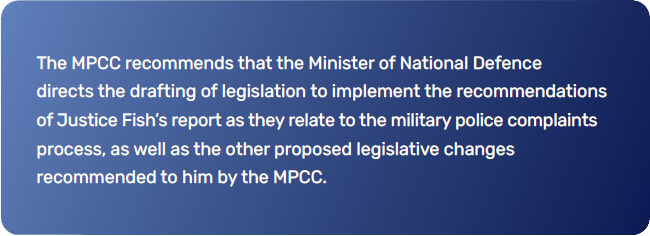
Alternate format
The MPCC recommends that the Minister of National Defence directs the drafting of legislation to implement the recommendations of Justice Fish’s report as they relate to the military police complaints process, as well as the other proposed legislative changes recommended to him by the MPCC.
Decisions at a Glance
Public Interest Investigations
The section below summarizes ongoing MPCC public interest investigations, as well as those completed by the MPCC in 2023.
House Fire-Attempted Murder Public Interest Investigation (MPCC 2016–027)
This complaint originated in 2016 with a Canadian Forces member who felt that the Canadian Forces National Investigation Service Western Region (CFNIS WR) had conducted a negligent investigation of a house fire on Canadian Forces Base Edmonton involving the complainant’s ex-spouse and their minor children. Despite conclusions by the insurance company and the Fire Marshal’s office that the fire was deliberately set, and the discovery of an apparent suicide note, no charges were laid at that time.
This case first came to the MPCC for review in 2018. Upon review, the former MPCC Chairperson, Hilary McCormack, felt there was evidence of a crime that ought to be reinvestigated. She therefore recommended that the CFPM reopen the case and have the house fire reinvestigated by an outside police service. The CFPM opted to refer the matter to CFNIS WR, but with a new investigative team headed by a seconded RCMP superintendent. The Chairperson put the MPCC’s review of the complaint into abeyance pending completion of the reinvestigation and any resulting judicial proceedings. The reinvestigation led to charges of arson and attempted murder against the complainant's ex-spouse, who was convicted in March 2023. The current MPCC Chairperson then directed that the MPCC resume its investigation into this complaint.
On September 28, 2023, the Chairperson declared a public interest investigation into the complaint. By the end of 2023, eighteen witness interviews had been conducted. Subsequent to resuming its review of this complaint in February of 2023, the MPCC experienced challenges with obtaining disclosure of relevant information from the CFPM. There were delays in providing information, as well as significant redacted and missing material. Ultimately, the MPCC filed a judicial review application in Federal Court, in December 2023, to compel the disclosure by the CFPM of missing and redacted material.
Updates on the progress of the investigation will be posted on our website, under the header "Timeline".
Military Police Unit Public Interest Investigation (MPCC 2021–012, MPCC 2021–017, MPCC 2021–026, MPCC 2022–001)
The case stems from a March 2021 incident, when a Military Police Officer (MPO) who appeared to be intoxicated, was seen leaving a restaurant with her children, whom she put in a motor vehicle. Bystanders intervened and civilian police attended the scene who, in turn, contacted the local Military Police Unit.
The MPCC launched a public interest investigation into this file after it received four separate complaints (two interference and two conduct complaints), containing a total of 17 allegations, about the conduct of the Military Police Unit leadership, including that:
- the Military Police Unit chose to proceed with administrative measures, rather than laying charges against the MPO, which indicated preferential treatment towards the officer;
- the Military Police Unit interfered in an investigation related to the well-being of the MPO’s children, following a second unrelated incident;
- the Military Police Unit "covered up" for the MPO.
In July and August of 2023, the MPCC issued interim reports for all four complaints related to this public interest investigation, and final reports in November and December 2023. The MPCC found that the allegations of interference were not substantiated and that the Military Police Unit leadership acted within their discretionary authorities and did not attempt to conceal the incident from appropriate authorities, namely, the Canadian Forces National Investigation Service (CFNIS) and the Office of Professional Standards of the CFPM, which were notified of the incident in a timely fashion.
The CFPM accepted the MPCC’s recommendation that, when the CFNIS has declined investigative responsibility for a case, it should outline its reasoning in the file. The CFPM did not accept the MPCC’s recommendation regarding the management of investigation files, citing software limitations. While giving due consideration to the MPCC’s concerns about the Military Police Unit’s morale and cohesion, the CFPM deemed a targeted review of the unit to be unnecessary considering changes in personnel since 2021.
Each of the complaints was dealt with separately and the MPCC has issued four final reports in the file. All the final reports are available on the MPCC website, under the header "Timeline".
Hiestand Public Interest Investigation (MPCC 2022–017, MPCC 2022–041, MPCC 2022–043)
On November 21, 2022, the then-Interim Chairperson, Bonita Thornton, decided that the MPCC would conduct a joint public interest investigation into three separate complaints concerning the actions of members of the CFNIS as well as members of a military police detachment located on a Canadian Forces Base. The complaints all relate to the military police’s handling of a sexual assault investigation. Six weeks after charges were laid, the accused, a Canadian Forces member, died by suicide.
The first two conduct complaints were brought by close relatives of the deceased Canadian Forces member. They complained that CFNIS investigators failed to interview, or receive evidence from, the accused prior to deciding to lay sexual assault charges against him and that the CFNIS failed to conduct an impartial and thorough investigation. The third conduct complaint came from a former military police member who witnessed the conduct of military police members at the local detachment when the sexual assault was initially reported. He complained that the military police members failed to record the victim’s initial police interview, despite there being the means to do so and that inexperienced military police members were assigned to conduct the interview.
In this case, the Office of Professional Standards of the CFPM commenced an investigation into the complaint, concurrently to the MPCC’s launching of the public interest investigation. That investigation is ongoing and near completion. In the meantime, the MPCC has been receiving disclosure and is assessing it as part of the MPCC’s public interest investigation.
Updates on the progress of the investigation will be posted on our website, under the header "Timeline".
Fortin Public Interest Investigation (MPCC 2023–006)
On April 20, 2023, the MPCC Chairperson decided to conduct a public interest investigation into a complaint concerning the actions of members of the CFNIS about the handling of a CFNIS investigation of a sexual assault allegation involving MGen (Retired) Dany Fortin, who was the subject of the investigation.
In his conduct complaint, submitted to the MPCC in January 2023, MGen (Retired) Fortin claims to have been the victim of a biased and partial police investigation. He further states that he was charged on the basis of insufficient evidence and that his prosecution was the result of undue political pressure.
On January 25, 2023, the MPCC requested disclosure in this file, which was only received on June 19, 2023. The MPCC is currently reviewing the disclosure, as well as information and documents received from MGen (Retired) Fortin, and preparing its investigative assessment.
On October 13, 2023, MGen (Retired) Fortin withdrew his complaint. The withdrawal of the complaint came one day after the issuance of a joint statement from MGen (Retired) Fortin and the Department of National Defence indicating that the civil legal proceedings commenced by MGen (Retired) Fortin, in which several senior officials and military officers were named as defendants, had been resolved. The correspondence stated that the complainant believed that his complaint to the MPCC should also be withdrawn, noting nonetheless that he would cooperate with the MPCC’s public interest investigation if the Chairperson were to decide to continue the process. Indeed, the National Defence Act allows the Chairperson to cause an investigation to be held even when it has been withdrawn. As such, and after consideration, the Chairperson decided to pursue the public interest investigation, citing the seriousness of the allegations, the alleged involvement of senior officials and military police members, and the public interest issues raised by MGen (Retired) Fortin in this matter.
Updates on the progress of the investigation will be posted on our website, under the header "Timeline".
Selected Case Summaries
The section below summarizes selected conduct and interference cases completed by the MPCC in 2023.
Conduct Complaint File (MPCC 2017–030)
The complainant challenged the legality of his warrantless arrest, the search and seizure of his smartphone and the manner in which the military police members led him to disclose his phone’s access code after it had been seized.
After review, the MPCC concluded that:
- although there were reasonable grounds to arrest the complainant, the circumstances did not justify proceeding without a warrant;
- the complainant’s arrest was a pretext to seize his smartphone, and that the lead investigator had violated the complainant’s rights by leading him to believe that timely access to legal counsel required that he divulge his phone’s passcode.
The MPCC made 4 recommendations:
- review the CFNIS internship program;
- require better documentation of changes to military police investigation plans;
- encourage prior consultation with technical experts by investigators before seizing electronic devices;
- emphasize the importance of note-taking by military police supervisors to better document changes to investigations as they progress.
The CFPM accepted three of the four recommendations. He did not accept to review the CFNIS internship program, however, proposed an alternative solution which the MPCC considered to be consistent with its recommendation.
More information on this case is available on our website in the following section: Conduct Case MPCC 2017–030 Summary
Conduct Complaint File (MPCC 2018–009)
Members of the military police responded to an emergency call from the complainant where she required assistance at her residence. They found her in a condition attributed to an overdose of drugs or prescription medication. Because of her medical condition, she was transported by ambulance to hospital.
The complainant states, among other things, that the military police searched her personal documents and cell phone without her consent; that an inaccurate and incomplete report was made to the provincial child protection agency following the intervention; that one of the subject military police members communicated directly with her spouse and insisted that he go to the scene of the intervention while accompanied by the couple’s children; and that one of the subject military police members recorded false information in her police notebook and falsified the police report with her colleagues.
The MPCC concluded that the complainant's allegations were not substantiated. With respect to the searches conducted during the intervention, the MPCC found that they were reasonable because:
- the searches were carried out to find information to assist a person in distress; and
- to determine what relevant information, if any, the military police could provide to emergency medical staff to assist in the treatment of the complainant.
The MPCC did, however, make one recommendation and one observation to the CFPM. It recommended that the Canadian Forces Military Police Orders include a requirement for military police members to record in their notes the information it provides to a children’s protection agency when a report is made. As well, the MPCC observed that the CFPM should have a system for safeguarding recordings of interviews conducted during military police investigations.
The CFPM did not accept the recommendation, indicating that not all circumstances requiring documentation of military police actions could be included in military police orders.
More information on this case is available on our website in the following section: Conduct Case MPCC 2018–009 Summary
Conduct Complaint File (MPCC 2020–038)
The complaint concerned the conduct of a sexual assault investigation. The complainant told the MPCC that she had been sexually assaulted on three occasions during an evening at a Canadian Forces Base and complained that the investigation into these events was inadequate on several levels.
The MPCC concluded that four of the complainant’s ten allegations were substantiated. In particular, the MPCC found that the lead investigator had not sufficiently investigated the allegation that the complainant had been drugged without her knowledge, had improperly assessed the credibility of witnesses, and had failed to consider matters relevant to his investigation.
The MPCC made four recommendations to the CFPM:
- remind the lead investigator of best practices and note-taking requirements;
- provide military police with additional training and develop a policy on interactions with victims;
- remind the lead investigator of the requirements for documenting reasons for any discretionary decision;
- recommend that a sergeant involved in the investigation be provided with refresher training in trauma–informed investigative methods, particularly interview techniques with victims of offences against the person.
The CFPM accepted the first recommendation mentioned above and partially accepted recommendations 2 and 3. The fourth recommendation was not accepted by the CFPM.
More information on this case is available on our website in the following section: Conduct Case MPCC 2020–038 Summary
Interference Complaint File (MPCC 2021–058)
The complainant and his supervisor, both members of the military police, disagreed about the charges to be laid against one of the individuals involved in a falsely reported incident. The complainant complained that his supervisor had interfered with his investigation, notably by asking him to amend his report and concluding remarks.
The MPCC concluded that the allegation was unsubstantiated. Nevertheless, it made one observation and four recommendations to the CFPM:
- implement the Military Police Mentoring Officer Program or its equivalent as quickly as possible;
- train all military police members affected to that Canadian Forces Base on the proper use of police response Codes 1, 2 and 3 in accordance with the relevant Canadian Forces Military Police Order;
- ensure that all military police vehicles at that Canadian Forces Base are equipped with a motor vehicle registration system, in accordance with the relevant Canadian Forces Military Police Order;
- ensure that all communications with dispatch at that Canadian Forces Base are recorded and preserved, in accordance with the relevant Canadian Forces Military Police Order.
The CFPM refused to substantially respond to the recommendations, stating that he did not have the legislative obligation to respond to them. The MPCC disagrees with this interpretation. This issue is discussed in more detail in the section "Oversight Challenges."
More information on this case is available on our website: Interference Case MPCC 2021–058 Summary
Interference Complaint File (MPCC 2022–055)
The complainant alleged that his superior had interfered with his investigation of six Canadian Forces members who had allegedly violated the Air Task Force’s alcohol and cannabis policy and had disturbed the peace by causing excessive noise, by attempting to influence the choice of charges to be laid.
The MPCC concluded that the complaint was not substantiated, and that the complainant’s supervisor had exercised her supervisory authority in a reasonable manner by reviewing the investigators’ discretion to lay charges.
More information on this case is available on our website : Interference Case MPCC 2022–055 Summary
MPCC Key Recommendations at a Glance
| CF Military Police Policies, Orders and Programs | ||
|---|---|---|
| CFPM to review the CFNIS internship program in light of the problems which arose in this investigation. | MPCC 2017–030 | not accepted |
| CFPM to take all necessary measures to ensure that communications with dispatch are recorded and preserved as evidence, as per the requirements of Military Police Order entitled "CF MP Gp Dispatchers." | MPCC 2021–058 | not accepted |
| CF Military Police Group Systems | ||
|---|---|---|
| CFPM to implement changes to the Security and Military Police Information System (SAMPIS) to enable the tracking of content changes to investigation files. |
MPCC 2021-017 |
not accepted |
| Subject military police members to review the Military Police Order pertaining to the operation of the Mobile Video Recording System (MVRS) within the CF Military Police Group to ensure compliance with the current procedures and guidelines. | MPCC 2017-029 |
accepted |
| Remind military police detachments of the importance of ensuring that MVRS within the CF Military Police Group are in proper working order. Remind military police shift supervisors to annotate the MVRS condition in the daily inspection report as set out in the Military Police Order entitled, "Mobile Video Recording System." | MPCC 2017-029 | partially accepted |
| CFPM to take all necessary measures to ensure that all marked and unmarked military police vehicles are equipped with a functional MVRS, as per the requirements of Military Police Order entitled, "Mobile Video Recording System." | MPCC 2021-058 | not accepted |
| Notes and Note-taking Procedures & Military Police Investigations | ||
|---|---|---|
|
Subject military police members to review Military Police Orders on note-taking and note-taking procedures to ensure compliance with current procedures and best practices. |
MPCC 2017–029 |
accepted |
|
Remind military police members of the need to document changes to investigation plans, including the timing and rationale for these changes. |
MPCC 2017–030 |
accepted |
|
Remind supervising military police members of the requirement to make notes regarding their involvement in military police investigations. |
MPCC 2017–030 |
accepted |
|
CFPM to amend Military Police Orders, particularly the Military Police Order on note-taking, to include a directive that when a military police member makes a report to a child protection agency, they must clearly indicate in their notebook and, where applicable, in the military police General Occurrence file, the information provided to that agency at the time of the report. |
MPCC 2018–009 |
not accepted |
|
CFPM to require that the CFNIS make appropriate notations on investigation files in SAMPIS where they have decided not to take over an investigation, including brief reasons for that decision. |
MPCC 2021–017 |
accepted |
|
Remind the subject military police members of the requirements and best practices of detailed, accurate and timely documentation in notebooks, and of the completion of all required elements of the General Occurrence files. |
MPCC 2019–024 |
partially accepted |
|
Remind the subject military police member of the best practices and requirements for documentation in the General Occurrence file and in the notebook of investigative and/or administrative activities, as well as any other information and opinion relevant to the investigation. |
MPCC 2020–038 |
accepted |
| Training and Guidance | ||
|---|---|---|
|
Provide military police members enhanced training and clearer guidance on subject identification and verification, particularly for intoxicated people, as well as the associated procedures and best practices. |
MPCC 2017–029 |
not accepted |
|
Remind subject military police members of the existing guidance in Military Police Orders and policies about seeking legal advice and that the CFPM encourage all military police members to consult with the Regional Military Prosecutors prior to laying charges, particularly in cases involving unusual facts or offences. |
MPCC 2017–029 |
accepted |
|
Provide guidance to military police members to encourage them, where possible, to consult with relevant technical experts on the proper handling of electronic devices prior to their seizure. |
MPCC 2017–030 |
accepted |
|
Provide military police members with additional training and develop a policy on interactions with victims, particularly in the context of the communication by investigators of decisions not to lay charges. |
MPCC 2020–038 |
partially accepted |
|
Provide subject military police member with refresher training in trauma-informed investigative methods, particularly interview techniques with victims of offences against the person. |
MPCC 2020–038 |
not accepted |
|
Provide training to military police members on the appropriate use of code 1, 2 and 3 responses, as per the requirements of Military Police Order entitled, "Operation of MP Vehicles." |
MPCC 2021–058 |
not accepted |
|
CFPM to institute as soon as possible the Military Police Coach Officer program or its equivalent, such as the Qualification Level (QL)-5 training, or in the interim, that the Canadian Police Knowledge Network be required training at all Canadian Forces bases. |
MPCC 2021–058 |
not accepted |
| Official Languages | ||
|---|---|---|
|
Remind military members of their obligations regarding official languages when interacting with other Canadian Forces members and members of the public, to ensure the right of a person being questioned, detained, or arrested to provide information in the official language of their choice is respected. If the military police members are unable to communicate in the official language of that person, arrangements must be made, within a reasonable time, to ensure compliance. |
MPCC 2017–029 |
partially accepted |
Access to Justice
In June 2023, some employees and members of the MPCC attended a decision-writing seminar by the Canadian Institute for the Administration of Justice. This customized training program was designed for the MPCC team to enable it to write decisions that are more accessible.
The MPCC also revised its registry protocols to improve accessibility for users and include trauma-informed approaches.
In June 2023, MPCC employees participated in a training session on trauma-informed approaches to working with victims of sexual violence. This training, offered by the Ontario Ministry of the Attorney General's Sexual Violence Advisory Group, was designed to give MPCC employees a better understanding of what a person goes through during a traumatic experience, as well as the lasting effects this experience has on the individual.
In September 2023, the MPCC hosted the KAIROS blanket exercise, an interactive learning tool that explores the historical and contemporary relationship between Indigenous and non-Indigenous peoples in Canada. This training, which was mandatory for all employees, is developed in collaboration with Elders, Knowledge Keepers and Indigenous educators. Employees appreciated this initiative, which was designed to support the government's Reconciliation priority.
Outreach & Engagement
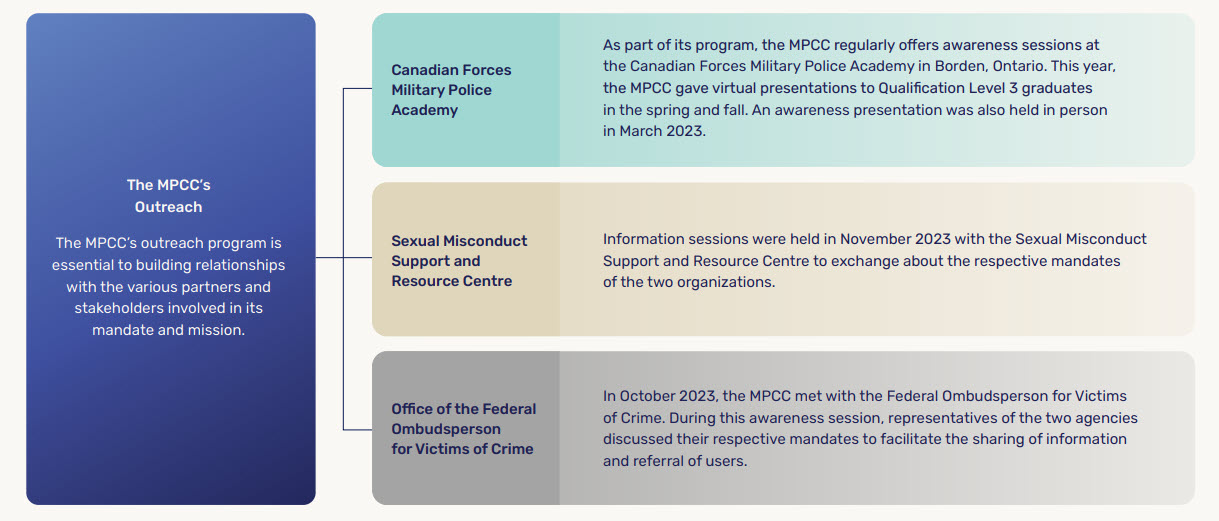
Alternate format
This is an image of a diagram showing the Military Police Complaints Commission of Canada (MPCC)’s outreach and engagement initiatives for 2023 with three organizations: 1) Canadian Forces Military Police Academy; 2) Sexual Misconduct Support and Resource Centre; and 3) Office of the Federal Ombudsperson for Victims of Crime.
On the left of the diagram, it reads
The MPCC’s Outreach
The MPCC’s outreach program is essential to building relationships with the various partners and stakeholders involved in its mandate and mission.
On the right of the diagram, the first line reads
Canadian Forces Military Police Academy: As part of its program, the MPCC regularly offers awareness sessions at the Canadian Forces Military Police Academy in Borden, Ontario. This year, the MPCC gave virtual presentations to Qualification Level 3 graduates in the spring and fall. An awareness presentation was also held in person in March 2023.
The second line reads
Sexual Misconduct Support and Resource Centre: Information sessions were held in November 2023 with the Sexual Misconduct Support and Resource Center to exchange about the respective mandates of the two organizations.
The third line reads
Office of the Federal Ombudsperson for Victims of Crime: In October 2023, the MPCC met with the Federal Ombudsperson for Victims of Crime. During this awareness session, representatives of the two agencies discussed their respective mandates to facilitate the sharing of information and referral of users.
The MPCC participated in the Heads of Police Oversight Agencies Annual Meeting and the Annual Conference of the Canadian Association for Civilian Oversight of Law Enforcement (CACOLE). It also participated in meetings of the Heads of Federal Agencies and the Council of Federal Administrative Tribunals Heads (CFATH).
Year in Review – Corporates Services
Financial Statement
Budget Constraint
The MPCC's total actual expenditures for the 2022–2023 fiscal year ending March 31, 2023, amounted to $4,658,493. The table below shows the breakdown of budget allocations for the period of April 1, 2023, to March 31, 2024.
| Main Estimates 2023–2024 |
Additional Authorities to be Received in 2023–2024 | Total Available for Use in 2023–2024 |
|
|---|---|---|---|
|
Salaries |
$2,941,737 |
$379,267 |
$3,321,004 |
|
Operating Costs |
$1,466,850 |
$463,644 |
$1,930,494 |
|
Total Budget |
$4,408,587 |
$842,911 |
$5,251,498 |
As of December 31, 2023, the MPCC was forecasting an overall budget surplus of $5,000 and had a total of 31 employees (14 in internal services and 17 in operations).
This year, the MPCC has experienced an unpredictable increase in expenses linked to the number and complexity of complaints.
As of December 31, 2023, the number of complaints almost doubled from the previous year and there has been an important increase in the number of complaints received related to sexual misconduct.
As the MPCC's core responsibility is the handling of complaints, it will always be faced with uncertainty as to the number and complexity of cases it will deal with each year. That said, the significant increase in the number of public complaints received this year, as well as the high number of significant issues the MPCC must address, notably with accessing the documents it needs to deal with complaints, has put a heavy strain on the MPCC's resources and hampered its ability to meet expected service standards. In July 2023, the MPCC submitted a request to the Department of National Defence for temporary additional funding for the 2023–2024 fiscal year, which it received.
There has been an increase in the cost of internal support services received from other federal departments under service level agreements. Fixed costs account for half of the MPCC's operating budget and increase each year due to inflation. Based on current projections, operating and fixed costs are set to increase in 2024, exceeding our main expenditure budget (the MPCC’s reference threshold).
Despite these increases in fixed costs, the MPCC's annual budget has remained unchanged since 2013, resulting in a real risk that the MPCC will reach its financial breaking point in the near future. For this reason, in November 2023, the MPCC submitted a request to the Department of National Defence for additional permanent funding starting in fiscal year 2024–2025.
Diversity, Accessibility & Inclusion
The MPCC is committed to strengthening its internal processes, as it strives to become more inclusive and accessible to the benefit of those it serves. The MPCC remains steadfast in using an approach that is trauma-informed, incorporating gender-based analysis plus (GBA+) principles, and viewing its work through an equity, diversity and inclusion lens.
This year, to improve accessibility, equity, diversity, and inclusion, the MPCC has
- improved the accessibility of its website content and reviewed its communication tools;
- set up a mechanism for external feedback for obstacles that may have been encountered by users, or for any other accessibility-related issues;
- published its first progress report on its Multi-Year Accessibility Plan;
- created a survey for its employees to ensure that its accessibility goals were being met, which highlighted that 100% of persons with disabilities felt that the MPCC accommodated their accessibility needs;
- supported the priorities of the Clerk of the Privy Council and other central agencies or government-wide initiatives, notably those dedicated to anti-racism, equity, diversity, and inclusion in the federal public service;
- defined performance objectives and indicators common to all MPCC employees, to be reflected in all employees' performance agreements, related to equity, diversity and inclusion;
- prioritized the recruitment, retention and promotion of employees from various employment equity groups to strengthen diversity, equity and inclusion within its workforce, which has exceeded government hiring targets in this regard: 28% of employees self-identified as members of a visible minority and 14% as persons with disabilities.
In 2022, First Nations Chiefs of Police, Association of Black Law Enforcers, and Serving with Pride were consulted on the bid selection process for the hiring of contract investigators to attract retired and diverse police officers to the MPCC’s pool of investigators. Several meetings were held during which potential barriers were discussed and feedback was gathered on the proposed criteria prior to posting. In 2023, feedback from these groups continued to influence the recruitment for the pool of investigators.
Mental Health and Employee Well-Being
The MPCC proactively shared and encouraged all staff to take part in mental health seminars and learning sessions to build mental health literacy. The MPCC continued to offer a variety of services to employees through an agreement with Health Canada to provide Informal Conflict Management Services including an Ombudsperson Service, an Employee Assistance Program and an arm's length service for reporting violence or harassment. Mental wellness was a frequent topic of discussion at all staff meetings throughout the year.
Corporate Information
Organizational Profile
Appropriate Minister(s):
The Honourable Bill Blair, Minister of National Defence
Institutional Head:
Me Tammy Tremblay, Chairperson
Ministerial Portfolio:
Enabling Instrument(s):
PART IV of the National Defence Act
Year of Incorporation / Commencement:
1998
Other:
For more information, please visit the MPCC's website.
Organizational Contact Information
Information line
613‑947‑5625 or toll-free at 1‑800‑632‑0566
Military Police Complaints Commission of Canada
270 Albert Street, 10th floor,
Ottawa, ON K1P 5G8
Note: We cannot guarantee the security of electronic communications. Therefore, please do not provide sensitive private information to us by email.
Website
Operating Context
Information on the operating context is available on the MPCC’s website.
- Date modified:
